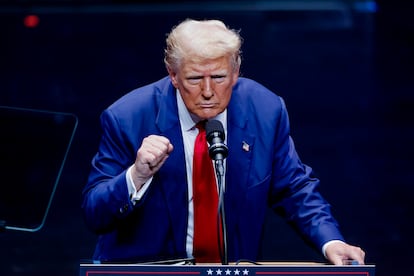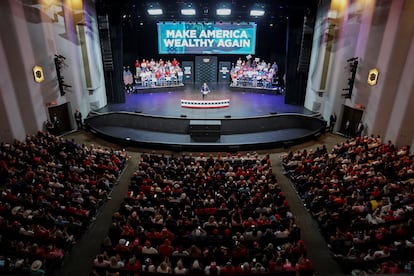Trump threatens 100% tariffs on cars imported from Mexico
At an event in Savannah, the Republican presidential candidate insisted on his protectionist messages as a recipe for economic policy


Donald Trump is doubling down on his use of economic protectionism as an electoral argument. The former president and Republican presidential candidate on Tuesday threatened to impose a tariff of 100% on cars imported from Mexico. “We will put a 100% tariff on every single car coming across the Mexican border,” he said during an event on the economy in Savannah (Georgia).
Major American manufacturers produce cars in Mexico. Even Trump’s ally, Elon Musk, has plans to build a large factory there, although for now they are on hold.
“The only way you can get rid of that tariff is if you want to build a plant right here in the United States with you operating that plant,” Trump added. “I want German car companies to become American car companies. I want them to build their plants here,” he said during the same speech. In fact, there are already many German car manufacturers (including Volkswagen, Mercedes and BMW) and Asian ones (such as Toyota or Hyundai) with large production plants in the United States.
Trump did not go into details of his proposal. A few months ago he said he would impose tariffs on cars manufactured in Mexico by Chinese companies, but now he seems to be talking about any imported vehicles.
The former president said that if he wins the November 5 election, he will add tariffs of up to 20% to every foreign import entering the United States, as well as another tariff of up to 60% on all Chinese imports. He also said he would impose a “100% tariff” on countries that move away from using the U.S. dollar.
In his protectionist rhetoric, Trump also threatened this week that tractor and agricultural machinery manufacturer John Deere would be subject to 200% tariffs if it moves production to Mexico. The U.S. company plans to manufacture some of its models in the neighboring country due to lower labor costs. The business says on its website that “in order to position our U.S. factories to undertake these highly value-additive activities it is sometimes necessary to move less complex operations, such as cab assembly, to other locations,” including the John Deere factory in Mexico, which has been in operation for 70 years.
Trump’s remarks in Savannah were part of his marked focus on protectionism in his economic speeches. A few weeks ago, in an address at the Economic Club of New York, he proposed to lower the corporate tax rate from 21% to 15% for companies that produce goods in the United States. “We want to manufacture our products in the United States and in most cases we can. If you subcontract, relocate or replace American workers, you will not be eligible for any of these benefits,” he said then.
On Tuesday he reiterated these messages, as well as promising tax cuts for high-income earners and corporations. “We are putting America first. This new American industrialism will create millions and millions of jobs,” Trump said.
But in order to enact tax reforms, it would not be enough for him to return to the White House; he would also need a Republican majority in both chambers of Congress.

Despite the tariffs he imposed during his term as president, the United States lost industrial jobs in his four years in the White House. Now he is promising an industrial renaissance, something that has largely occurred under his successor, Joe Biden, who has also pursued a protectionist policy and granted multi-billion-dollar aid and tax breaks for investments in strategic sectors.
“With the vision I’m outlining today, we’re not only going to stop our companies from leaving for foreign lands, but under my leadership, we’re going to take jobs from other countries,” he said. “Have you ever heard that expression? Have you ever heard that we’re going to take jobs from other countries? It’s never been said before. We’re going to take their factories, and four years ago we were very clear, we’re going to bring thousands and thousands of companies and trillions of dollars in wealth back to the good old United States.”
With this defense of extreme protectionism, Trump is breaking with the Republican tradition of free trade. Tariffs on imports imply higher costs for American companies (if the goods are intermediate goods) or higher prices for consumers (if the goods are final consumer goods).
Sign up for our weekly newsletter to get more English-language news coverage from EL PAÍS USA Edition
Tu suscripción se está usando en otro dispositivo
¿Quieres añadir otro usuario a tu suscripción?
Si continúas leyendo en este dispositivo, no se podrá leer en el otro.
FlechaTu suscripción se está usando en otro dispositivo y solo puedes acceder a EL PAÍS desde un dispositivo a la vez.
Si quieres compartir tu cuenta, cambia tu suscripción a la modalidad Premium, así podrás añadir otro usuario. Cada uno accederá con su propia cuenta de email, lo que os permitirá personalizar vuestra experiencia en EL PAÍS.
¿Tienes una suscripción de empresa? Accede aquí para contratar más cuentas.
En el caso de no saber quién está usando tu cuenta, te recomendamos cambiar tu contraseña aquí.
Si decides continuar compartiendo tu cuenta, este mensaje se mostrará en tu dispositivo y en el de la otra persona que está usando tu cuenta de forma indefinida, afectando a tu experiencia de lectura. Puedes consultar aquí los términos y condiciones de la suscripción digital.








































